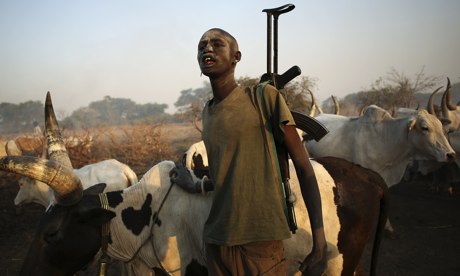 |
| "A young cattle herder from the Dinka tribe carries his AK 47 rifle near Rumbek, capital of the Lakes State in central South Sudan." (Goran Tomasevic/Reuters) |
By Daniel Howden
The Guardian, December 23, 2013
"A week ago, Simon K, a 20-year-old student living in the capital of South Sudan, was arrested by men in military uniforms. He was asked a question that has taken on deadly importance in the world's newest country in the past seven days: incholdi -- 'What is your name?' in Dinka, the language of the country's president and its largest ethnic group. Those who, like Simon, were unable to answer, risked being identified as Nuer, the ethnic group of the former vice-president now leading the armed opposition and facing the brunt of what insiders are describing as the world's newest civil war. Simon K was taken to a police station in the Gudele market district of Juba, where he was marched past several dead bodies and locked in a room with other young men, all Nuer. 'We counted ourselves and found we were 252,' he told the Guardian. 'Then they put guns in through the windows and started to shoot us.' The massacre continued for two days with soldiers returning at intervals to shoot again if they saw any sign of life. Simon was one of 12 men to survive the assault by covering themselves in the bodies of the dead and dying. Simon spoke from inside the UN compound that has become an emergency sanctuary to the remaining Nuer in the capital. Sitting on a filthy mattress by the side of a dirt road, with bandages covering bullet wounds in his stomach and legs, he recalled: 'It was horrible, because to survive I had to cover myself with the bodies of dead people, and during the two days, the bodies started to smell really bad.' In the space of seven desperate days, the UN base has been transformed from a logistics hub for an aid operation into a squalid sanctuary for more than 10,000 people. Amid the confusion of bodies and belongings, a handmade sign hangs from the rolls of razor wire. 'The lord is our best defender,' it reads. But there is no sign here of the lord's defence, as the country that gained independence in 2011 with huge international fanfare and support has come apart in the space of a week.
